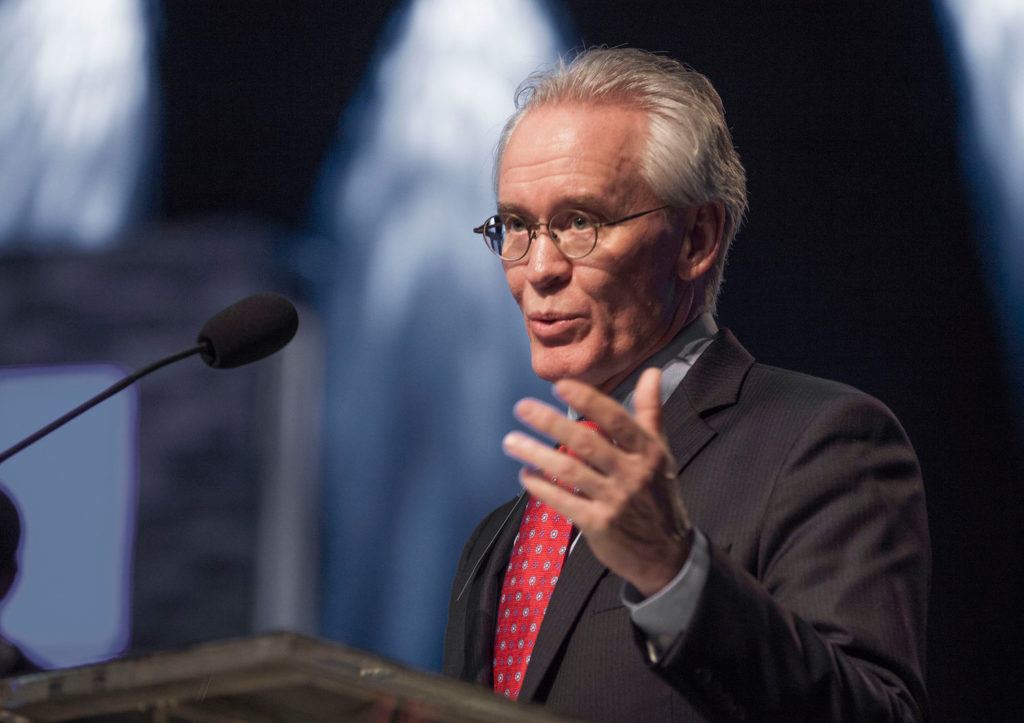
Dignity is the missing mark of modern leadership, Mohler says at Leadership Briefing
By Jeff Robinson, SBTS
The missing mark in much modern political leadership is dignity, Southern Seminary President Albert Mohler argued Sept. 29 at the annual Leadership Briefing in Heritage Hall at The Southern Baptist Theological Seminary.
In this year’s Leadership Briefing, Mohler examined the life and leadership of the recently deceased Queen Elizabeth II. The Queen served as England’s monarch for 70 years and died on September 8 at age 96. In his address, titled “The Mandate of Dignity: Queen Elizabeth II and the Missing Element of Modern Leadership,” Mohler held up Elizabeth as a leader whose lengthy reign exemplifies unwavering dignity at the highest level of leadership.
Queen Elizabeth’s state funeral was one of the most highly watched events in history, drawing the undivided attention of Americans whose country is founded upon the rejection of the English monarchy in favor of a constitutional republic. Yet, Americans are fascinated by the English monarchy as evidenced by the massive number of people in the U.S. who mourned the queen’s passing and watched her funeral with rapt attention.
“Something seems to be missing from our national experience that is present in the British system,” Mohler said. “Why are Americans drawn to the British crown? I would argue that there’s a particular reason.”
Mohler drew on The English Constitution, a book written in 1867 by English businessman and journalist Walter Bagehot, which examines a distinction in Britain’s government between the “efficient” part and the “dignified” part. The efficient part makes policy and manages the day-to-day machinery of government; the dignified part provides what Mohler called the “spectacle” or visual—an appropriate sense of stateliness intrinsic to royalty, but a part that should characterize all leaders. In England, Parliament represents the efficient part, the crown the dignified part.
“I think one of the reasons we felt such longing when we looked to the funeral of the late queen, we looked to her life: 70 years lived in nothing but service to her country and nothing but stability, nothing but personal honor, nothing but dignity. She embodied dignity. She was raised to embody dignity.
“She seems to have believed that God put her on earth, in his providence, for her to be the queen of England to provide stability for as long as she would live—stability and legitimacy. When she spoke of her life—whether short or long—being lived in service to the British people, she didn’t mean as a field nurse in the army; she meant as the embodiment of the nation. Queen Elizabeth II embodied this dignified part.”
Mohler pointed out that Queen Elizabeth II was also a sincere follower of Christ who spoke often of her faith. Elizabeth came to the throne a few years after King Edward VIII who had failed morally and ultimately abdicated. Elizabeth viewed reestablishing moral credibility to the monarchy as central to her service on England’s throne.
Mohler cited examples of other leaders from recent history who, like Queen Elizabeth II, embodied the dignified element in leadership, particularly during seasons of national and international adversity: President Franklin Delano Roosevelt and his guidance of the U.S. during World War II, former United Kingdom Prime Minister Margaret Thatcher during the Falklands War, and Ronald Reagan throughout his two terms as U.S. president.
“Ronald Reagan represented that dignified part,” Mohler said, “whether it was the (Space Shuttle) Challenger disaster or any number of other events, including what became the end of the Cold War.
“American leadership and political leadership in our time has often come down to the right combination of the dignified and the efficient. No British monarch could have stood there in Berlin and looked into the camera and said, ‘Mr. Gorbachev, tear down that wall.’ That took someone who understood the dignified part. Ronald Reagan carried off the dignified part, but he was also commander-in-chief of the most powerful armed forces in the world and those who heard him say that in Berlin understood that.”
Dignity in leadership is scarce today, Mohler said, but it is an attribute that must be recovered for a nation or organization truly to flourish.
“The dignified part requires dignity,” Mohler said. “It’s difficult to imagine how it may be recovered. But then again, it must be recovered.”
The Leadership Briefing is Mohler’s annual series of biographical addresses on renowned leaders throughout history who’ve left an indelible mark on societies, countries, industries, and organizations. Past addresses are available at the Leadership Briefing Archives.
Truett McConnell University seeks to fill communications void with new bachelor’s degree
By ROGER ALFORD, The Christian Index
CLEVELAND, Ga. – A fledgling communication program at Truett McConnell University is intended to provide a pipeline that puts Bible-believing graduates into high-profile positions where they can influence public opinion and public policy.
“We seek to educate journalists, attorneys, public office holders, corporate spokesmen, press secretaries, on-air newscasters, and other communication professionals,” said Barry McCarty, dean of the university’s Hans Denck School of Communication. “And whatever our graduates do for a living, they will do it with a Christian worldview, being witnesses to the truth of the gospel.”
The mission of Truett McConnell, which is affiliated with the Georgia Baptist Convention, is “to prepare students to boldly fulfill the Great Commission in whatever their calling may be.”

Truett McConnell President Emir Caner said the program will also be a benefit to churches looking for employees to fill open positions in media and communications.
“Churches are finding it really difficult to find qualified people for those roles,” Caner said. “This new program will resolve that.”
The north Georgia school offers degrees in biology, business administration, Christian studies, criminal justice, education, English, exercise science, global studies, history, humanities, music, nursing and psychology, and each of those fields, McCarty said, requires topnotch communications skills.
“Even professions that are not primarily thought of as communication vocations usually require people to speak and to write clearly and persuasively,” he said. “One of the areas I am particularly interested in preparing students for is the law. I’m hoping that a number of our students use their BA degree in communication as a pre-law program. The degree covers all the basic skills – how to think, how to speak, how to write with clarity and force. We ground our students in the basics so that they can succeed in whatever professional specialization they choose.”
On its website, Truett McConnell makes clear that it is at its core a Christian university where “students are challenged to fearlessly live out their faith as they are learning, growing, and becoming what God meant for them to be. … Our students receive a one-of-a-kind education that is focused around these four pillars: love the Lord, love His Word, love the church, and love the lost.”
McCarty, who has been the Southern Baptist Convention’s chief parliamentarian for nearly 40 years, joined the Truett McConnell faculty as professor of rhetoric and communication and founding dean of the new Hans Denck School of Communication in 2020. He previously served as a professor of preaching and rhetoric at Southwestern Baptist Theological Seminary, president of Cincinnati Christian University, and as pastor in Georgia, Ohio and Texas.
An Atlanta native, McCarty holds a bachelor’s degree in biblical studies from Mid-Atlantic Christian University, a master’s in speech communication from Abilene Christian University, and a Ph.D. in rhetoric and argumentation from the University of Pittsburgh.
Bailey Wilber, a junior communication major, said she is considering a career in public service, and she said the School of Communication will help her prepare for that because it teaches young Christians to better articulate their thoughts.
“I consider talking to be my spiritual gift,” said Wilber, a member of the Truett McConnell golf and lacrosse teams. “With this degree, you learn how to be articulate, speak, and connect to people in a better way in a world that doesn’t want you to be heard.”

















